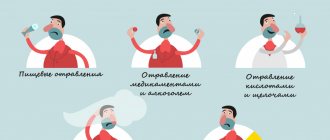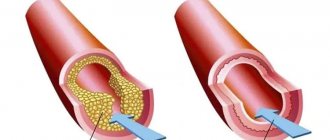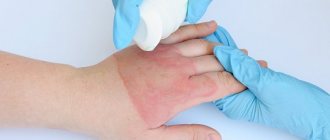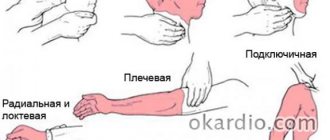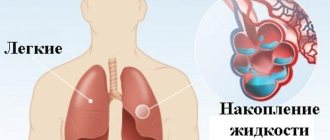Drug addiction inevitably leads to personality degradation and the development of serious pathologies. An overdose of psychotropic substances causes an acute condition that requires urgent medical attention. Every addict sooner or later falls into this state. Severe drug poisoning leads to coma and, in many cases, death.
- Read in the article:
- What is a drug overdose?
- Causes of drug overdose
- Signs of drug intoxication: what will happen
- Behavior of a drug addict during an overdose
- Foaming at the mouth due to drug poisoning
- Pupils during drug intoxication
- Stages of drug overdose
- Drug poisoning
- Intoxication of the body
- Drug coma
- Types of overdoses
- Opiate poisoning
- Overdose of psychotropic drugs
- Salt overdose
- Amphetamine poisoning
- Hallucinogen poisoning
- MDPV overdose
- Overdose of pills
- Spice poisoning
- Overdose of speed
- Heroin overdose
- Overdose on grass
- Death from drug overdose: signs
- Consequences of drug overdose: what happens after
- Drug antidotes
- Emergency care for drug poisoning: urgent drug treatment
Treatment prices:
| Sign up for a free and anonymous consultation with a narcologist | 0 ₽ |
| Initial consultation with a narcologist | for free |
| Consultation with a psychologist in person or Skype | 3 000 ₽ |
| Psychiatrist consultation | 5 000 ₽ |
| Psychodiagnostics / pathological diagnostics | 7 500 ₽ |
| Narcopsychotherapy | 50 000 ₽ |
| Consultation with a psychologist and selection of a treatment and rehabilitation program for an addict | for free |
| Intervention session | 12 000 ₽ |
| Social rehabilitation of alcohol addicts | for free |
| Outpatient rehabilitation in Moscow | 33 000 ₽ |
| Standard rehabilitation program | 40 000 ₽ |
| Intensive rehabilitation program | 80 000 ₽ |
| Premium rehabilitation program | 120 000 ₽ |
| Medical and social rehabilitation (21 days) | 150 000 ₽ |
| Rehabilitation Spain, Bulgaria | 200 000 ₽ |
| VIP rehabilitation program | 350 000 ₽ |
| Online addiction rehabilitation course | 28 000 ₽ |
| Rehabilitation of age-related alcohol addicts | 50 000 ₽ |
| Rehabilitation of drug addicts | 60 000 ₽ |
| Adolescent social-psychological-pedagogical rehabilitation | 70 000 ₽ |
| Psychotherapy | 5 000 ₽ |
| Family psychotherapy | 6 000 ₽ |
| Support groups for loved ones of addicts | for free |
| Webinars for relatives of addicts | for free |
| School for codependents | 3 000 ₽ |
| Transfer support | negotiable |
| Motivation for treatment | 6 000 ₽ |
| Escort to the clinic | 6 000 ₽ |
| Testing (urine/blood/hair) | specify |
Expand
Still have questions? Call us!
8
Free consultation and appointment
Causes of drug overdose
Medical practice shows that most often poisoning occurs from the use of large doses of heroin and sleeping pills. Less commonly, an overdose of a hairdryer or cocaine occurs. The severity of intoxication is determined by the amount and composition of the substance. The causes of overdose are the following factors:
- Intravenous drug administration
. With this method of administration, all the drug immediately enters the bloodstream. - Mixing drugs containing drugs
. An overdose is often caused by the simultaneous use of drugs of the same group, as well as in combination with alcohol. - Toxic additives in the drug
. Clandestine manufacturers and distributors often add dangerous chemical impurities to drugs, which increase the weight of the product.
The drug addict’s body quickly gets used to the dose with the same amount of impurities. Therefore, even a purer product can cause a negative reaction. Often an overdose occurs after a long period of drug withdrawal. During the rest period, the body manages to wean itself off drug-containing substances, and a seemingly habitual dose causes acute poisoning.
Methods for determining codeine in the body
There is no specific test for determining codeine in the body, so analyzers aimed at detecting morphine are used for research.
At home, as well as in laboratories, test strips are used as a preliminary study, the work of which is based on immunochemical analysis. The most informative are the following rapid tests:
- ImmunoChrome-Morphine-Express, Narcochek for the determination of morphine in urine;
- Vivacek to detect metabolites in the blood.
If the result is positive, the biological material is sent for further research in the laboratory. To obtain more detailed information about the dosage of the substance and the duration of drug addiction, a chemical-toxicological analysis is prescribed.
Blood, urine and hair are used for laboratory testing. At the same time, hair analysis is the most informative, as it allows not only to confirm the fact of drug abuse, but also to determine the length of drug addiction and the dosage of the substance.
Signs of drug intoxication: what will happen
Drug poisoning can be immediately identified by a number of symptoms, and measures can be taken. A person’s behavior changes, their general health deteriorates, they may lose consciousness and fall into a coma. At this time, it is important to quickly provide qualified medical support.
Behavior of a drug addict during an overdose
Poisoning of the body is expressed in a change in human behavior. He becomes inhibited and ceases to control himself. Anxiety and panic can trigger outbursts of anger and aggression. In this state, a person experiences suicidal thoughts and can harm himself and loved ones. Poisoning with drugs can lead to loss of consciousness, during which there is a high probability of falling into a coma.
Complications
At the first stage, many drug addicts use “salt” without thinking about the consequences. Each of them mistakenly believes that they can quit at any moment. The addiction intensifies, and after a month or two, taking the next dose becomes the only goal in life for a person. Constant poisoning of the body with toxic compounds leads to the appearance of first reversible and then irreversible consequences:
- If a person has a hereditary predisposition to mental illness, then after “salt” the likelihood of a deviation increases many times over.
- Decreased intellectual abilities.
- Tendency to depression and suicide. Suicides are very common among salt consumers. The reason for this is life's troubles, aggravated by a bad mood.
License and certificates:
Foaming at the mouth due to drug poisoning
One of the visible symptoms of poisoning from synthetic designer drugs is nausea and vomiting, often foaming at the mouth. If these symptoms of overdose become obvious, you should immediately call an ambulance. Doctors will detoxify the body and relieve the acute condition with the help of droppers.
Pupils during drug intoxication
During an overdose, the pupils change depending on the type of drug taken. If opiate poisoning occurs, this leads to constriction of the pupils. In case of poisoning with psychostimulant drugs, on the contrary, the pupils dilate and stop responding to light.
Analogs
The closest analogue of codeine is desomorphine, which is produced in artisanal conditions with codeine preparations. Desomorphine is better known among drug addicts as krokodil. The drug also contains chemical and toxic components that make it the most toxic and aggressive psychotropic substance. Dependence on desomorphine develops after the second dose. Each new dosage leads to rapid destruction of cells of the nervous and immune systems. Desomorphine is used intravenously, and necrotic foci form at the injection site, which leads to the development of gangrene and sepsis. Desomorphine drug addicts live no more than one year.
Heroin is the second narcotic analogue that belongs to synthetic opiates. Heroin is taken intravenously, inhaled through the nose, or less often orally. The drug is a semi-synthetic opiate. Dependence on heroin is formed after the first injection, and chronic drug addiction becomes the cause of multiple organ failure and complete personality degradation.
Pharmacy analogues include opioid analgesics, which are similar in their pharmacological action to codeine, among them:
- Oxymorphone in a therapeutic dosage has an analgesic effect, but if it is exceeded, it causes narcotic intoxication, and if abused for a long time, psychophysical dependence. Oxymorphone can cause an overdose, which is accompanied by pulmonary edema, depression of respiratory and cardiac activity.
- Promedol is a drug that was originally used to reduce the toxic effects on the body. However, later its psychostimulant properties were noticed. Drug addicts began to use Promedol for recreational purposes and considered it a safe drug. Abuse of the drug has led to overdose and the development of side effects, including coma, convulsions, renal, cardiac and respiratory failure.
Treatment calculator
Field score:
Total score:
Patient age
Length of use
What he uses Has he previously undergone treatment Consent to treatment Concomitant diseases Employment
Waiting for values to be entered
Drug poisoning
The first symptoms of poisoning are always a deterioration in general health, weakness, and headaches. If these signs appear, you should immediately call a doctor. The more time is lost, the worse the consequences will be.
Intoxication of the body
Experienced drug addicts have all their organs and internal systems in poor condition, and develop diseases and pathologies. Intoxication leads to even more severe consequences. The effect of drugs can only be neutralized with the use of effective medications.
Drug coma
If a drug addict falls into a coma during an overdose, his nervous system stops working and breathing becomes impaired. The person seems to be sleeping, but it is impossible to wake him up; he does not react to any actions or sounds. If this condition is ignored, it may get worse.
Psychical deviations
Mental disorders are also typical signs that an addict is using “salt.” Soon after the substance enters the body, the following is noted:
- severe anxiety and persecution mania;
- speech defects;
- spastic muscle contractions, expressed in involuntary movements of the lower jaw;
- hallucinations (mostly auditory, but sometimes visual);
- animated gestures, chaotic movement of limbs and head);
- sleep disturbance;
- strong foul odor from sweat and sebaceous glands;
- the appearance of delusions and delusions of grandeur.
Types of overdoses
The body reacts completely ambiguously to the effects of drugs of different origins and composition. With some overdoses a person becomes weak and weak-willed, with others - aggressive and uncontrollable. In case of poisoning, it is important to find out exactly what substance the person consumed. Detoxification of the body occurs with the use of drugs that are suitable only for a specific type of drug.
Opiate poisoning
When overdosing on opiate substances, the addict experiences:
- problems with respiratory function;
- the pupils of the eyes narrow;
- pulse slows down.
The skin takes on a pale or bluish tint. The person stops responding to sounds and other external stimuli.
Overdose of psychotropic drugs
If the dose of psychostimulant drugs is exceeded, then the following appears:
- Strong headache;
- the heart begins to beat rapidly;
- possible tremor of the arms and legs;
- increased sweating.
In serious cases, loss of consciousness occurs. Psychostimulants include cocaine, ecstasy and methamphetamine-type substances.
Salt overdose
Synthetic salts have a strong effect on the brain. Manufacturers of the drug often change its composition without adhering to a specific formula. It is quite difficult to determine the concentration of the active substance, which leads to overdoses.
Salt poisoning causes:
- dizziness;
- nausea;
- chills;
- in more severe cases, high temperature rises;
- chest pain appears;
- panic begins.
Amphetamine poisoning
When an amphetamine overdose occurs, a person sweats heavily, the temperature rises, and he cannot control his actions.
In case of severe poisoning, the following are clearly expressed:
- signs of stroke;
- dry mouth;
- nausea.
Skin rashes may develop. If symptoms of poisoning occur, the person should be immobilized and call a doctor or ambulance.
Hallucinogen poisoning
Drugs that have hallucinogenic properties can completely change a person’s mental state. An overdose threatens the appearance of persistent hallucinations and psychosis, which often lead to suicide.
MDPV overdose
With the maximum dose of MDPV, the consequences are very dire. First, the substance causes a state of psychosis, then it hits the cardiovascular system with a shock wave. The drug addict's blood pressure begins to fluctuate and his heart rhythms become erratic. Failure to provide assistance in a timely manner can lead to death.
Overdose of pills
Medicines that are used as sleeping pills, when used uncontrolled, cause severe addiction. With a small overdose, the symptoms are not too pronounced and may go away on their own. A person may experience weakness and lethargy. In case of serious poisoning, the pupils constrict and the patient may fall into a coma or die.
Spice poisoning
Spice is usually used as a smoking mixture. Persistent addiction to the drug occurs literally after just a few doses.
Spice overdose manifests itself:
- nausea;
- vomiting;
- dizziness;
- convulsions;
- loss of consciousness.
The main cause of poisoning is the poor quality of the product.
Overdose of speed
People who use speed quite often experience an overdose. When poisoning occurs, consciousness begins to become confused, convulsions appear, and body temperature rises. In severe cases of poisoning, the drug addict’s speech becomes slurred and heart failure occurs.
Heroin overdose
Heroin is considered the most dangerous drug. Overdose causes severe and often irreversible consequences. Breathing may slow down, leading to suffocation, and the brain stops working normally. Heroin poisoning often causes cardiac arrest. If symptoms of a heroin overdose appear, the addict should urgently call a doctor. The specialist will detoxify and cleanse the body of poison.
Overdose on grass
Marijuana or hemp are drugs of plant origin. However, to enhance the narcotic effect, the grass is often treated with dangerous chemicals.
In case of a cannabis overdose in a person:
- pupils dilate;
- the skin turns red;
- mucous membranes dry out.
The addict loses control of his movements and speech.
Withdrawal syndrome
Treatment of codeine addiction is not only dangerous for the health and life of the drug addict, but is also fraught with constant breakdowns, as it is complicated by withdrawal syndrome, which is better known as “withdrawal.” The severity of the clinical picture of withdrawal syndrome depends on the length of drug addiction. When mental and physical dependence is formed (the second and third stages of dependence), “withdrawal” lasts from two weeks to a month and is accompanied by pronounced symptoms:
- aches in muscles and joints;
- convulsions;
- psychosis;
- increased irritability;
- causeless, uncontrollable aggression;
- lacrimation;
- sneezing;
- nausea, vomiting, diarrhea;
- increased body temperature, blood pressure;
- increased heart rate;
- sweating, chills;
- insomnia;
- weakness;
- exhaustion, anorexia;
- dry, pale skin.
During the period of abstinence, a drug addict is capable of doing anything for the sake of a new dose.
However, it is quite difficult to recognize a codeine addict by external signs, so testing is required to establish the fact of substance abuse.
Death from drug overdose: signs
Severe drug addiction and frequent overdoses always lead to early death. With systematic drug use, toxins accumulate in the human body, which have a detrimental effect on all organs. Very often, an overdose causes cardiac arrest. An important organ cannot cope with a huge dose of poison. If resuscitation is not taken in time, the person will die. Also, the death of a drug addict can occur from a lack of oxygen, which causes suffocation.
Artificial respiration technique
The algorithm of actions when performing artificial ventilation is as follows:
- After making sure that there are no foreign bodies (including vomit) in the upper respiratory tract, tilt the drug addict’s head back and, pressing on the corners of the lower jaw with both hands, open the mouth, pushing it forward and upward.
- If necessary, the drug addict's mouth is covered with thin gauze (to avoid infection with certain diseases).
- Next, you must close the addict’s nose and “inhale”, wrapping your lips around the victim’s lips. To do this, take as deep a breath as possible and immediately (instantly) exhale the air from your lungs to the victim. It is important to “inhale” immediately after taking air into the lungs, so that the oxygen does not have time to metabolize into carbon dioxide and enters the drug addict unchanged!
- About 18–20 “breaths” are taken within a minute. The absence of a pulse is an indication for closed cardiac massage.
Consequences of drug overdose: what happens after
If a drug addict was saved from poisoning with psychotropic substances, the consequences will still be negative. Often, after severe poisoning, a person develops nervous diseases, chronic diseases worsen, taking on incurable forms, including oncology. Often, drug addicts who have retained some sanity, after an overdose, decide to get rid of their addiction forever. Then they go to a drug treatment clinic for treatment and rehabilitation. This takes quite a long period, but the positive result is worth it.
How to survive withdrawal
To eliminate withdrawal symptoms, it is best to contact specialists at the clinic and undergo full treatment. They will help:
- slowly reduce the pressure until completely stabilized;
- restore the functioning of the nervous system and mental functions;
- relieve pain and spasms;
- reduce body temperature to normal levels;
- eliminate the urge to vomit, diarrhea.
In the first few weeks, or even months, a person needs complete rest. During this time, he should sleep and eat as much as possible to return to normal. After which, rehabilitation will be required to prevent a breakdown.
Drug antidotes
An antidote is a drug that is an antidote to drug poisoning. The substance completely blocks the effect of the drug. It is included in medications for detoxifying the body in emergency situations. So, in case of an overdose of opiates, naloxone or its analogs - naltrexone or nalorphine - are used. You should not try to relieve intoxication on your own. Only the doctor calculates the dosage of the drug.
Emergency care for drug poisoning: urgent drug treatment
An overdose of drugs of any group requires urgent assistance from narcologists. In a specialized drug treatment clinic, all conditions have been created for detoxification of the body and subsequent treatment for drug addiction.
If the poisoning is severe, then a narcologist will carry out all the manipulations at home. Specialists provide emergency assistance at any time of the day. Experienced specialists will not only provide assistance, but will also try to convince the drug addict to go to a hospital for treatment and rehabilitation.
Still have questions? Call us!
8
Free consultation and appointment
In case of overdose, the doctor must first determine the type of drug in order to choose the correct antidote. Then the person needs to rinse the stomach and put on a drip with strengthening medications. All drugs are certified and effective. Medicines will not only cleanse the body of toxins, but also help normalize the functions of internal systems.
conclusions
We wish you not to find yourself in difficult life situations that are associated with psychoactive substances and the consequences of their use. However, if such a situation has already happened in your life, or you have witnessed an overdose in a stranger, you must be armed and know how to provide such a person with emergency assistance, and immediately call us so that the specialists of the European Institute of Addiction "ADOMED" can save the patient’s life and provide him with quality treatment.
TAKE CARE OF YOURSELF AND TRUST THE PROFESSIONALS!
Hotline on issues of alcoholism, drug addiction and gambling addiction:
+38 (067) 125-33-55
+38 (095) 125-33-55
